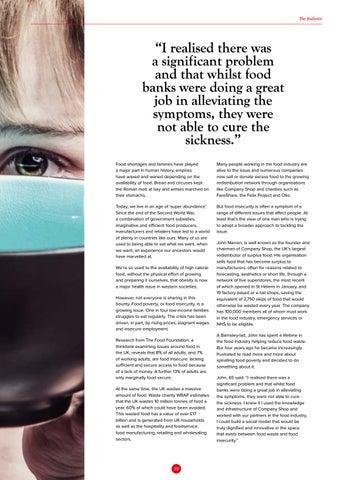The Bulletin
“I realised there was a significant problem and that whilst food banks were doing a great job in alleviating the symptoms, they were not able to cure the sickness.” Food shortages and famines have played a major part in human history, empires have waxed and waned depending on the availability of food. Bread and circuses kept the Roman mob at bay and armies marched on their stomachs.
Many people working in the food industry are alive to the issue and numerous companies now sell or donate excess food to the growing redistribution network through organisations like Company Shop and charities such as FareShare, the Felix Project and Olio.
Today, we live in an age of ‘super abundance’. Since the end of the Second World War, a combination of government subsidies, imaginative and efficient food producers, manufacturers and retailers have led to a world of plenty in countries like ours. Many of us are used to being able to eat what we want, when we want, an experience our ancestors would have marvelled at.
But food insecurity is often a symptom of a range of different issues that affect people. At least that’s the view of one man who is trying to adopt a broader approach to tackling the issue.
We’re so used to the availability of high calorie food, without the physical effort of growing and preparing it ourselves, that obesity is now a major health issue in western societies. However, not everyone is sharing in this bounty. Food poverty, or food insecurity, is a growing issue. One in four low-income families struggles to eat regularly. The crisis has been driven, in part, by rising prices, stagnant wages and insecure employment. Research from The Food Foundation, a thinktank examining issues around food in the UK, reveals that 8% of all adults, and 7% of working adults, are food insecure: lacking sufficient and secure access to food because of a lack of money. A further 13% of adults are only marginally food secure. At the same time, the UK wastes a massive amount of food. Waste charity WRAP estimates that the UK wastes 10 million tonnes of food a year, 60% of which could have been avoided. This wasted food has a value of over £17 billion and is generated from UK households as well as the hospitality and foodservice, food manufacturing, retailing and wholesaling sectors.
35
John Marren, is well known as the founder and chairman of Company Shop, the UK’s largest redistributor of surplus food. His organisation sells food that has become surplus to manufacturers, often for reasons related to forecasting, aesthetics or short life, through a network of five superstores, the most recent of which opened in St Helens in January, and 19 factory-based or e-tail shops, saving the equivalent of 3,750 skips of food that would otherwise be wasted every year. The company has 100,000 members all of whom must work in the food industry, emergency services or NHS to be eligible. A Barnsley-lad, John has spent a lifetime in the food industry helping reduce food waste. Bur four years ago he became increasingly frustrated to read more and more about spiralling food poverty and decided to do something about it. John, 65 said: “I realised there was a significant problem and that whilst food banks were doing a great job in alleviating the symptoms, they were not able to cure the sickness. I knew if I used the knowledge and infrastructure of Company Shop and worked with our partners in the food industry, I could build a social model that would be truly dignified and innovative in the space that exists between food waste and food insecurity.”
